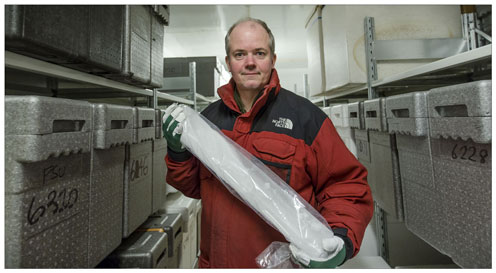Climate research receives a 4.5 million DKK grant from the Carlsberg Foundation
Sune Olander Rasmussen, Associate Professor at the Ice and Climate research group, has received a grant of 4.5 million DDK from the Carlsberg Foundation for research into climate change. The project will provide new knowledge about the mechanisms behind the sudden climate change of the past, thus improving our ability to cope with the risk of future climate change.

Sune Olander Rasmussen in the ice core freezer at the Center for Ice and Climate at the Rockefeller Center.
The ChronoClimate project will provide new knowledge on the mechanisms of abrupt climate changes of the past, thereby improving our ability to manage the risk of future abrupt climate change. The project will generate new ice-core data and develop improved methodologies for dating and integration of climate data series from different natural archives and parts of the climate system. This chronologically consistent information on past abrupt climate change will then be analysed together with climate model data in order to investigate the governing mechanisms of climate change in the oceans, cryosphere, and atmosphere.
Abrupt climate change constitutes an major risk for humanity and is at the same time an outstanding research challenge with enormous potential for increasing understanding of the interplay between the components of the climate system—the oceans, the atmosphere, and the cryosphere. While the main focus of the project is the climate change of the past, the increased process understanding can largely be transferred to the climate of the future, thereby improving the predictive power of climate models, as well as identifying under which conditions abrupt climate change occurs.
Still miss an overall understanding of climate change
Despite the fact that the existence of abrupt climate change in the glacial has been known for more than 40 years, we still miss an overall understanding of how the different parts of the climate system played together during these times of fundamental reorganisation of the climate system. In a densely populated world likely to undergo significant climate changes over the next centuries, it is of key importance to better understand how climate changes propagate and influence other regions and parts of the climate system. ChronoClimate will contribute to this, and in addition help inform on the risk of future abrupt climate change by addressing under which climatic boundary conditions abrupt climate changes have occurred in the past.
The first part is focused on improving Greenland ice-core chronologies and making new links to Antarctic ice cores. The second part of the project aims to establish a new common chronological platform for climate records by integrating information from e.g. ice cores, marine sediments, and caves, thereby quantifying and resolving differences in dating methodologies. Beryllium-10 measurements will enable new synchronization opportunities between ice cores and other climate data, circumventing problematic assumptions about globally synchronous climate change. Finally, based on the aggregated data series and observed timing differences between changes in different parts of the climate system, we will formulate and test hypotheses about mechanisms of abrupt climate change.

Sune Olander Rasmussen, Associate Professor at the Ice and Climate group, Niels Bohr Institute, University of Copenhagen, Email: olander@nbi.ku.dk
Topics
See also:
Contact
Sune Olander Rasmussen, Associate Professor at the Ice and Climate group, Niels Bohr Institute, University of Copenhagen, Email: olander@nbi.ku.dk
The Cryosphere
The cryosphere consists of all water that is on Earth in frozen form or in the solid phase as ice. The Earth's cryosphere is estimated to be 26,000,000 km3 out of the 1,360,000,000 km3 hydrosphere. The cryosphere includes ice on land, glaciers, ice cover on the Polar Sea, permafrost, icebergs and snow.
